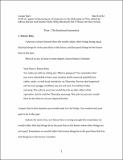Time--The Emotional Asymmetry
Author(s)
Hare, Caspar
DownloadCJHareEmotionalAsymmetry-1.pdf (164.9Kb)
OPEN_ACCESS_POLICY
Open Access Policy
Creative Commons Attribution-Noncommercial-Share Alike
Terms of use
Metadata
Show full item recordAbstract
A person is future-biased when she would rather, other things being equal, that bad
things be in the past than in the future, and that good things be the future than in
the past.
Most of us are, at least to some degree, future-biased. Consider:
Your Past or Future Pain
You wake up with an aching jaw. What is going on? You remember that you were
scheduled to have your wisdom teeth removed, painfully but safely, under a weak local
anesthetic, on Thursday. But has that happened yet? In your groggy condition you are not
sure. It could be Friday morning. The ache in your jaw would then be an after-effect of
the operation. And it could be Thursday morning. The ache in your jaw would then be the
distress of your impacted teeth.
Date issued
2013Department
Massachusetts Institute of Technology. Department of Linguistics and PhilosophyJournal
A Companion to the Philosophy of Time
Publisher
John Wiley & Sons
Citation
Hare, Caspar. "Time--The Emotional Asymmetry." in A Companion to the Philosophy of Time, edited by Adrian Bardon and Heather Dyke, Wiley Blackwell, 2013, pp. 507-520.
Version: Author's final manuscript
ISBN
9780470658819
9781118522097